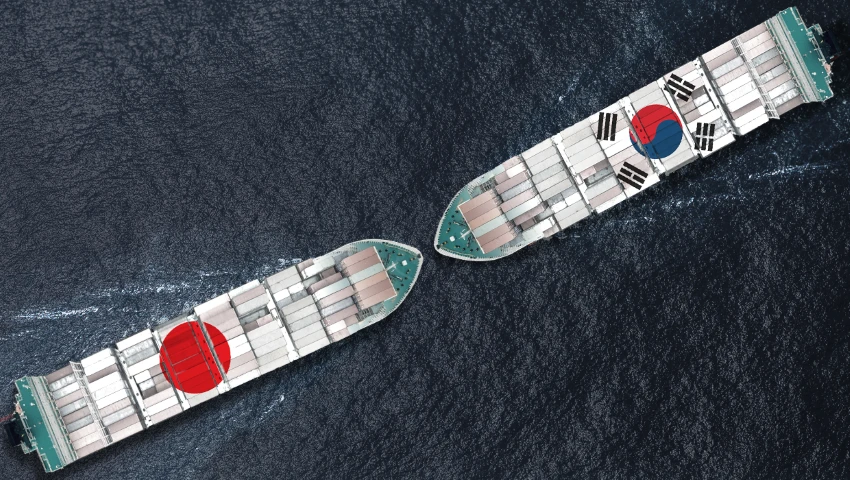
In an apparent tit-for-tat move, South Korea said Monday it will remove Japan from its "whitelist" of trusted trade partners, an act that risks exacerbating tensions between the two U.S. allies.
Sung Yun-mo, South Korea's trade, industry and energy minister, said the government will strip Japan of its fast-track status by downgrading it one notch to a newly established classification in its export control system.
"We are pushing for this regulation revision according to our own examinations," Sung told reporters in Seoul. "I want to say that we are doing this legitimately in line with both domestic and international laws."
The ministry said the new classification will tighten its control on more than 1,700 strategic products and materials being exported to Japan. After listening to opinions for 20 days from entities including the Japanese government, as well as South Korean companies and individuals, Seoul will put Tokyo in the new category next month.
In short, the revision means that South Korean companies exporting strategic materials and products to Japan will be required to submit five documents -- up from three -- with the process taking as many as 15 days, rather than the current five.
The trade ministry's list of strategic goods with military applications spans 1,735 entries. A ministry source cited chipmaking machinery, network security equipment and telecommunications gear as significant exports to Japan that appear on the list.
But the economic and industrial impact of the curbs on Japan is expected to be limited. Memory chips -- for which South Korea dominates the market -- likely will not be subject to the stricter screening, and Japan does not rely heavily on other South Korean products.
Generally, Japan supplies parts and materials to South Korea, which uses them in products sold worldwide. Seoul logged a $24 billion trade deficit with Japan last year, its largest with any single country. Its top exports to Tokyo were petrochemicals, steel sheet and semiconductors, according to the Korea International Trade Association.
Some in Tokyo regard Seoul's move as retaliation for Japan's decision this month to take South Korea off its own whitelist.
Should this prove to be the case, "it could be considered a violation of World Trade Organization" rules, Masahisa Sato, vice minister for foreign affairs, tweeted Monday.
A Japanese government insider suggested that Seoul might have decided it needed to look tough on Tokyo ahead of National Liberation Day on Thursday, which commemorates Korean freedom from Japanese colonial rule.
South Korea's Sung indicated that Seoul remains open to dialogue, but Japan seems unwilling to accept the offer. "We have no intention whatsoever of holding talks" on the matter, another Tokyo insider said.
Japan said it acted because of questions over South Korea's management of strategic materials. But Seoul believes Tokyo made its move because the government of Prime Minister Shinzo Abe was upset with South Korean Supreme Court rulings last year that ordered Japanese companies to pay reparations to Koreans forced to work in Japan during the colonial period of 1910-1945.
The neighboring countries have long been at loggerheads over a number of historical and territorial disputes. Among other issues, they both lay claim to tiny islands that lie between the two nations, and argue over the legacy of Japan's occupation and the use of so-called comfort women by Japan's military during World War II.
Monday's move comes amid a consumer boycott in South Korea of Japanese products and services. Few people are visiting Uniqlo shops in the country, and sales of products such as Asahi and Sapporo beers have dropped sharply.
Experts say the two countries need to take the heat out of the tensions, and focus on resolving what many see as a lose-lose situation.
"South Korea and Japan are neighbors that cannot be separated. Fortunately, the two countries share democracy and capitalism as well as close exchanges in the private sector that have developed for the last two decades," Gil Yun-hyung, a former Tokyo correspondent of the Hankyoreh newspaper, said in a forum. "We can argue with each other, but can resolve any issue through dialogue and compromise."




















